One of the biggest concerns when SHTF is the lack of access to medical care.
The prospect of being your own doctor might be daunting, but knowing you have all the supplies you need is a good starting point.
That means knowing what to stock, and how to store it to keep it in good condition for the long-haul.
What Medicines and Medical Supplies to Stockpile?
There are a number of over-the-counter (OTC) drugs that earn a place in your emergency medical stocks. These include:
• Antacid: Calcium Carbonate. This medication is used to neutralize stomach acid. It can be used for heartburn, upset stomach, or indigestion.
• Antibiotic cream or ointment. These are used to treat minor wounds or skin infections.
• Anti-diarrhea: Loperamide. This drug helps to control diarrhea and prevent dehydration. It can be used for acute, short-term diarrhea or irritable bowel syndrome (IBS).
• Antiemetic: Meclizine: This OTC drug is effective against nausea and vomiting. It’s usually used for motion sickness and vertigo-like dizziness.
• Antihistamine: Diphenhydramine. This OTC drug is commonly used to treat the symptoms of hay fever and allergies. This includes red, irritated, itchy, and watery eyes, as well as allergy-related sneezing and runny nose.
• Anti-inflammatory: Naproxen. This drug is used to relieve inflammation and joint and muscle pain. It’s similar to Ibuprofen but has a longer effect, up to 12 hours.
• Decongestant: Pseudoephedrine. This OTC drug is used for nasal congestion caused by colds, hay fever, allergies, and bronchitis.
• Laxative: Polyethylene Glycol 3350 and Glycerin Suppositories. These drugs are used for loosening stools and treating constipation. Glycerin suppositories are rectal laxatives that can be used if polyethylene does not work to relieve mild to moderate constipation.
• Petroleum jelly, aloe vera gel, and hydrocortisone cream, and other antifungal creams. Used externally to provide relief for skin conditions and allergies.
• Pain Relief: Ibuprofen or Aspirin and Acetaminophen. These medicines are good for headaches, toothaches, muscle strains, back pain, and arthritis pain. Ibuprofen combined with Acetaminophen can be used to address severe pain.
As well as OTC drugs, there are some important medical supplies that you need to stock:
• Rubbing alcohol, hand wipes.
• Bandages, gauze pads in different sizes.
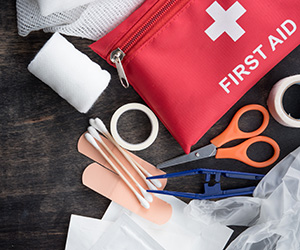 It’s worth investing in a good first aid kit that includes a CPR mask, a thermometer, a variety of bandages, and items that will help manage more complex traumas.
It’s worth investing in a good first aid kit that includes a CPR mask, a thermometer, a variety of bandages, and items that will help manage more complex traumas.
There are various kits available that have different contents, and are more or less portable. Some contain medication and some do not.
Your first aid kit will also need to be stored safety and checked regularly to ensure items are not out-of-date.
How to Store Medications Safely
When storing medicines, it’s important to note that air, heat, direct sunlight, and moisture may damage them. You should keep your drugs in a cool, dry place, protected from direct light.
Some medications, including insulin and some eye drops, require refrigeration. Make sure to place your medicines away from the cooling wall of your fridge, as temperatures that are too cold will also affect the medicine’s efficacy.
The best place to store your medication is in the fridge door. Place the medicines in a sealed container to avoid potential contamination from the food you have in the fridge.
Related: The Only Meds That You Need To Stockpile for SHTF
Generally:
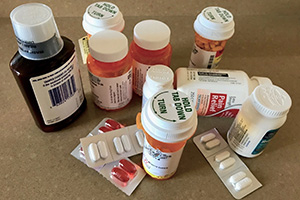 • It is better to keep the medicine in its original container.
• It is better to keep the medicine in its original container.
• A pack of silica gel inside a medicine bottle acts as a desiccant to keep humidity under control and ensure the medicine is not affected by molds and mildew.
• Do not put a cotton ball in the medicine bottle as it draws moisture into the container.
• If unsure, ask your pharmacist for specific instructions on how to store the drugs.
Where to Store OTC Medicines?
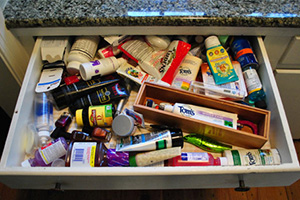
• Keep your medication in a cool and dry place.
• You may put them in your dresser cabinet or kitchen cabinet – but make sure they are far from the stove, sink, or any other hot appliances that might affect the medicine.
• Most people store their medicines in the bathroom – which is not advisable. The humidity inside the bathroom is high which can lessen the potency of the drugs, or they may deteriorate before expiry dates.
• Keep your medicines and medical supplies out of reach and out of sight of children or pets. If possible, store them in a cabinet with a child-proof latch or lock.
How to Organize Drugs and Medical Supplies?
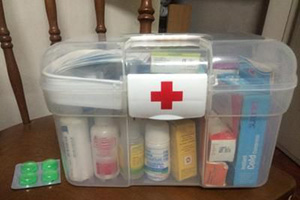
• You can store your medication in a special box that is well sealed. Make sure you use one that is big enough to accommodate all your drug containers and bottles.
• You can also use a small to large organizer drawer (depending on the quantity of medication you have) to keep your medicines and supplies organized. They can be easily purchased at shopping malls and big-box stores.
• For example, you may put the OTC drugs on the first top two drawers and then the bandages, gauze pads, and other supplies at the bottom.
• Adding labels to identify what to use for different conditions is also a good idea so you and your family can easily find the right products and return them to the right section.
• Make sure to label the medicines clearly.
Related: Prepping to Power Medical Equipment When SHTF
Disposing of Old Medicines
It’s important to ensure that the medicines you are using or will use are still safe to take. Expired, unwanted, or unused medicines should be disposed of.
• It’s not advisable to flush the medicine down the toilet as it is not good for the water supply.
• If you wish to throw medicines in the trash, mix them first with something that will ruin their form or appearance. For example, mix them with coffee grounds or kitty litter, and then put the mixture in sealed plastic.
• Medicines might be good for you but might not be safe for someone else. So the best way to dispose of expired and unused medicines is through the drug take-back programs. Many communities offer that – check with your law enforcement officials for the nearest location.
• Alternatively, you can ask your pharmacist. They might have on-site drop-off boxes and mail-back programs.
The proper storage of OTC drugs and medical supplies is imperative in ensuring your medicine’s safety. By doing so, you can be assured that they are safe to take and are efficacious when you need them.
Finally, make sure you have a good first aid manual that will give directions on the use of medication and emergency health procedures. Store this near to your first aid kit or medicine location.
You may also like:
 7 Items To Stockpile To Keep Your Car Running After An EMP
7 Items To Stockpile To Keep Your Car Running After An EMP
“Nature’s Prozac” Or The Instant Anxiety Relief Plant That Could Be Growing Near Your House (Video)
How To Grow A Food Garden Completely Hidden In Plain Sight
Shocking Riot Videos and Pics: Watch Protesters Destroy Armored Vehicle With Molotov Cocktails

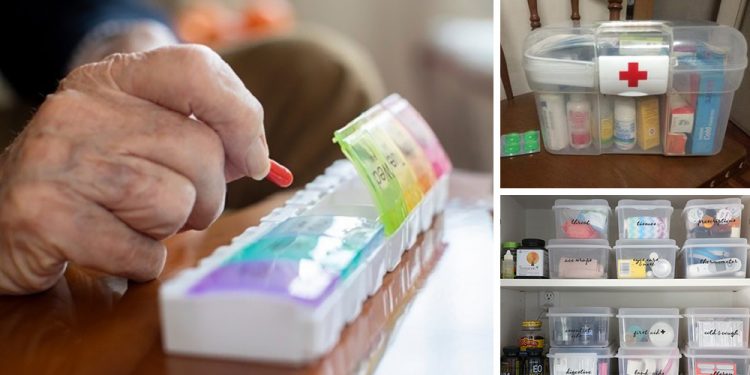













ANTIBIOTICS – if you have the scope and dosage amounts that the Prep Docs advise to stockpile for those severe SHTFs – you are aware of the $$$$$ involved – no availability these days also …
follow all the advice in this article for good storage procedures – but – add in a well-hidden home cache or gun safe shelf location for security holding …
no great secret that home burglars search for prescription drugs – bottles of antibiotics would be a big bonus haul and one of the prep items that draw thieves from poor OPSEC practices ….
You can buy fish antibiotics online from fishmoxfishflex.com – apparently just as good for people! This is what I did, at Andrew Skousen’s advice (son of Joel Skousen, author of the great book, Strategic Relocation).
I can only hope a burglar eats a bunch of my meds. lol. Said thief will certainly not get high. Not any higher, at least, than the gurney in an ambulance. Just the same, I keep them out of sight.
Vacuum pack OTC medicines and keep them in a cool, dry place like an airtight tub or even in the bottom drawer of a spare fridge. Pills will last indefinitely like that. Pills vacuum packed into a flat shaped bag can be stacked and do not take-up much space.
If you are going to store your meds in the vegetable drawer of a fridge and you have humidity controls on the drawer as many refrigerators have, be sure to set the humidity to “LOW”.
An inner closet, one that doesn’t connect to an outer wall is also a good place to store things that are temperature sensitive. Get three cheap thermometers and set one outside in the shade, one inside in a room doesn’t have a southern/western exposure and set the third thermometer deep in your inside closet if you have one. When it is the hottest outside, check your room thermometer and then check your closet thermometer. I think you will find that the closet thermometer will be significantly lower than even your northern/eastern exposure room. If you now add a styrofoam cooler to the inside closet and put your thermometer inside the styrofoam cooler, I think you will be pleasantly surprised at the difference in temperature.
I just broke open my food storage container that I have carried in my van since, apparently, 2013. I had three things stored in there, ClifBars, SOS bars and Quaker Instant Oatmeal packages. I intend to write up an article about how those items fared for Claude.
An ammo storage box is good – air tight, waterproof, and sturdy. They can be stacked and not crushed.
Harbor Freight ones are NOT air tight.
Especially the plastic ones.
You have to use a double seal zip lock baggie WITH a desiccant bag inside it before placing in one of those boxes.
Crazy: That’s why they are as cheap as they are. The main advantage using the plastic Harbor Freight boxes is that they are cheap. But like everything else in life, if you pay Yugo prices you get a Yugo. If you want a Mercedes, you have to pay Mercedes prices.
If plastic ammo boxes are your thing, you may want to look at MTM Case-Gard.
I’ve always included Pepto Bismol tablets in any first aid or travel kit, BOB, camping supplies, it is excellent for relief of nausea and diarrhea, even the severe diarrhea of amoebic dysentery. Recent studies show it effective at killing the micro organisms that can cause diarrhea, which might give it an advantage over Loperazole (Immodium) in treating water borne illness. Both are good products, cheap and must haves.
We tend to prepare for the extreme case if it involves lots of guns, ammo, or cool gear but medical advice is always, have a good 1st aid kit. After 7 months as a full time caregiver trying to get my wife back on her feet after she got the neuro-invasive form of West Nile Virus I realize people are going to get seriously ill from time to time and need a lot of nursing care. The 1st thing you ought to add to your prepping supplies is a couple of good bedpans. People confined to bed are going to have to pee and poo in bed, too. Add lots and lots of baby wipes to your preps, too, and consider what your linen changing and washing situation might be. Have a separate supply of supplements for serious illness, fiber supplements can be very important. A big stack of micro fiber cloths, for soft and gentle cleaning, and mild liquid soap. Pedialyte and a supply of babyfood. Long flexible drinking straws because a person can’t drink lying down and you won’t be able to hydrate with an I.V. I guess pneumonia might be the most common illness that could put a person flat on their back for weeks. Various accidents and illnesses. This sort of threat is at least as likely as having to fight off a vicious gang of Cossacks and Liberals attacking your house through its layered defenses of fougasse, toe poppers, and caltrops. It’s a lot more fun to go to the range and blaze away than to get a nursing handbook and learn some basic caregiver techniques but I think one is equally important as the other.
I wrote an article on proctoclysis which is an old-timey method of re-hydration where the patient is too far gone to be able to ingest fluids per os as the medicos like to say, but where IV infusion is unavailable for whatever reason. Unfortunately, while I thought it would be of significant interest to readers of this list, Claude, exercising the right of censorship that list owners seem to be inflicting on the web thought that nobody would be interested in how to save the life of an infant or unconscious adult who was suffering from dehydration.
Proctoclysis was used during the War of Northern Aggression for wounded, dehydrated troopers on both sides of the line and used up through WWI, the War to End All Wars. When IV infusion became the standard of care, it was abandoned but still is continued to be used in Third World countries where the standard of care in Los Angles isn’t quite available in the hinterlands of some country where roads aren’t paved and electricity is sporadic at best and the doctor comes via four-wheel drive, high-center vehicles once a month.
If you are concerned about medical care after the end of the world and would like to know more about proctoclysis, look it up. Avoid all the references about it being used in the Sandbox to induce compliance to interrogation. That is torture, not medical practice. Don’t misinterpret my comment. I am not against compelled discussions with folks who want to know during wartime with fourth generation combatants. I am just against it when it is applied to me or my kin.
I first learned about proctoclysis reading Selco Bercovic’s book about his experiences in the End of The World events that took place in Sarajevo during the ethnic cleansing. At first I thought it was some kind of Middle European folk remedy but further investigation revealed that it is an old-fashioned, but successful method of re-hydration for severely impacted individuals. It is used more in infants who are deathly ill with typhoid fever or other intestinal bacterial infections and are too feeble to drink fluid by mouth. It works for unconscious adults too, who are critically dehydrated due to wounds or disease or otherwise on death’s door.
Things that don’t go bad that can help are always good to have on hand too. I just purchased something called a “Bug Bite Sting Remover Thing” on Amazon for around $10. It’s a reusable suction tool for bee stings and other bug bites. Good way to save on topical anti itch creams and lotions! My dr recommended it, so it w has a place in my travel medical bag next to my tick remover
Don’t forget the zinc to knock out tick fever. I used to get nailed by ticks a lot, and had to use that to keep from getting sick. niio
Bandages, lots and lots of bandages, some tourniquets too, and not the cheap ones! Everyone likes to get the cool guy stuff for a gunfight, but they don’t think they or their team will get hit, I guess. Anyone who has ever seen a gunshot wound treated will attest to the huge number of bandages required for just one. Some Quik Clot wouldn’t hurt either.
Here I the big city, i carry extra strength Tylenol, Quick Clot and Israeli Bandages in my makeup case just in case I get into a scuffle.
Heck, Wyatt, if anyone ever thought there was a possibility that they could get hurt in a gunfight, we probably wouldn’t have wars. Nobody ever goes into a firefight thinking, “I’m going to get waxed and it is going to hurt like hell and I might die. The other guy might, but not me.”
It is only when your leg is almost ripped completely off by a direct hit on your tibia from a distorted bullet that ricocheted off some concrete that reality sets in.
The movies always show the hero getting shot and an hour later he is able to engage in hand-to-hand combat with a bad guy. A shoulder wound in Hollywoodland is nothing at all. Are you kidding? That’s where the joint is for your arm. Ever tear your rotator cuff? How did that feel? How long was it before you could raise your arm above your shoulder? Ever break your collar bone? That’s not a really serious injury but it sure isn’t a lot of fun either. Try rasseling with a bad guy with a broken collar bone. Yeah, right. Let me know how that went.
You are most certainly right, Wyatt. Most preppers don’t really prepare for all the nasty things that can happen to us and how we will be out in left field without a glove when we accidentally whack our tibia with the axe while cutting wood, breaking it and also having a really nasty cut which is bleeding profusely. Or even more fun, whacking our ankle and almost, but not quit severing our foot. Nothing like seeing your foot dangling by just a couple of shreds of flesh to bring home reality.
Don’t think that will ever happen? Spend a Saturday in the clinic in a town where city folks go to get their cut-your-own Christmas trees in the national forest. I promise, you will see all kinds of interesting lacerations and protruding bones. A leg lacerated by a chain saw is really a challenge. Even if the distal end is cut completely off, the debriding, stitching and cleaning up the jagged bone ends present significant time-consuming challenges to the local surgeon. Not to mention treating for shock and blood loss because our hero didn’t think he would ever use a tourniquet and didn’t want to waste $50 on something he would never use. He knows how to handle a chain saw. Luckily, somebody came along who quickly whipped off our hero’s leather belt and cinched it down tightly enough to keep him from bleeding out before he could get moved to a vehicle.
What ta do with left over medicines? Why that’s easy! Yall just take any and everything ya got left and dump them in the still right along with the tater-mash, let it cook fer a while and what you end up with is a nice batch of fine crystal clear hooch with a bit more BITE to it! I tell you though, with 18 chidlins and a couple barefoot wives or three hangin’ around the shack ain’t much left over of anything, much less official pharmacy grade drugs! Still, you can always dig up a few shrooms to go in the hooch, and, failing that, you still got the old gut rot itself! Thrive and alive, one jug at a time!
The FDA website has information on a Nation wide program to dispose of unwanted pharmaceuticals. Here, there is a locked drop box at a local pharmacy where one can just drop off any unwanted medicines or drugs for proper disposal.
Both baking soda OR mustard are alternatives for antacid.
Just in case
At one time, long, long ago and far, far away, the leading antacid was a little tin like aspirin used to come in and it held bicarbonate of soda tablets which stout businessmen used to consume on a regular basis. When I was a young tad, also long, long ago, the sulfanilamide I was taking was supposed to be hard on one’s stomach, so in addition to the huge sulfa pill I had to take twice daily, I also had to take a bicarbonate of soda pill. In other words, baking soda pill. I guess the advantage of a pill was that it was a precisely measured dosage whereas a “teaspoonful” of baking soda could vary widely.
Yes, if you want an antacid, baking soda will do the trick nicely and also make biscuits too. If you don’t have pill form, dissolve a teaspoon full of baking soda in 8 ounces of water and, holding your nose, down it. It is an alkali and will counteract an acid reflux condition — temporarily.
Castor oil used to be used to make certain bodily functions more regular if one suffered from “IRREGULARITY”. I never could make the connection between castor beans being highly poisonous — we had a case here in River City where wifey, wanting to change spouses but not pay spousal support as she made a lot more money than dear hubby, treated him to a smoothie containing a lethal dose of castor beans — and using castor oil to make one regular. The castor beans did not make hubby regular — well, I suppose you could say being dead was sort of regular.
I should say that I am sorry for all the bad puns about a very serious matter, but unfortunately my evil twin is in possession of the keyboard tonight.
I have things stored as per Dr. Still its a good reminder.
Antacid, herbal: A source of calcium. Ground limestone, sea shells, yogurt, meditate on God’s peace and joy.
Antibiotic cream or ointment, herbal: Yogurt, tobacco (a pinch, moistened, but it burns!), calèndula petals, and many more things.
Anti-diarrhea, herbal: Pinch of tobacco! Yogurt. Calèndula petals or one scant teaspoon of rosemary in a cup of boiling water (rosemary is toxic, so use only in an emergency like food poisoning, where it should neutralize the effects in an hour–take no more than 2 8 ounce cups a day, and sip it slowly).For parasites, tobacco and yogurt, and copper or brass, both of which were scared in every culture because they’re anti-parasite, even killing liver flukes.
Decongestant: Peppermint oil. Mixed with other things, like tobacco, will halt allergic asthma attacks, something that can kill by swelling the throat shut. Best way is always with snuff (AKA Scotch snuff/medicated snuff), and snorted into each nostril. I use Vicks, which is supposed to be a natural product. niio
If you can store your medicine in a box, you do not have enough for a long term survival situation. Mine won’t fit into the biggest plastic tote you can buy at your local store.
Some crucial supplies you didn’t mention are dental supplies. Tooth brushes, tooth paste, orajel and dental floss are invaluable when there is no dentist. My hubby wears dentures so I stockpile those supplies, too.
You also need bandaids, especilly if you have children. Cuts will need protection from dirt etc. to keep them from getting infected.
Think about what items your family uses regularly. I have generic migraine medicines, cough drops, bacitracin and cotton swabs. I frequently have to put bacitracin in my nose for excessive dryness. I can do it with a tissue, but that is wasteful and more difficult.
The last item I stock is Tea Tree Oil. Awesome stuff! Research online the many ways you can use it.
Throwing away “expired’ drugs is stupid. The FDA did a study for the military called the Shelf Life Extension Program (SLEP) and found that MOST pills and capsules stayed effective for YEARS after the so called “expiration date”. The other info in this article is pretty good.
https://www.astho.org/Programs/Preparedness/Public-Health-Emergency-Law/Emergency-Use-Authorization-Toolkit/Federal-Shelf-Life-Extension-Program-Fact-Sheet/
Catheters. When you need one nothing and I do mean nothing else will work.
Invest in essential oils and herbals. Take the time to learn what alternatives exist and how to use them
Do the homework
research ,download , save ,copy for later
while you still can
most drugs have alternative natural cures found in nature as in many articles in this site
dont depend on the big pharma addiction network to keep you on their system
not fix the problem
anything in the pharmacy is to keep you dependant on the pharmacy
learn to endure hardship so when it happens you can endure it
this is called acclimation
when i get my physical each year the doctors tell me I am a rare person as most are on 5 medications or more by the age of 40 , so wake up and see what is really going on
DEPENDENCE
use common sense , not cold turkey or sudden disconnect , takes time to remove dependancy